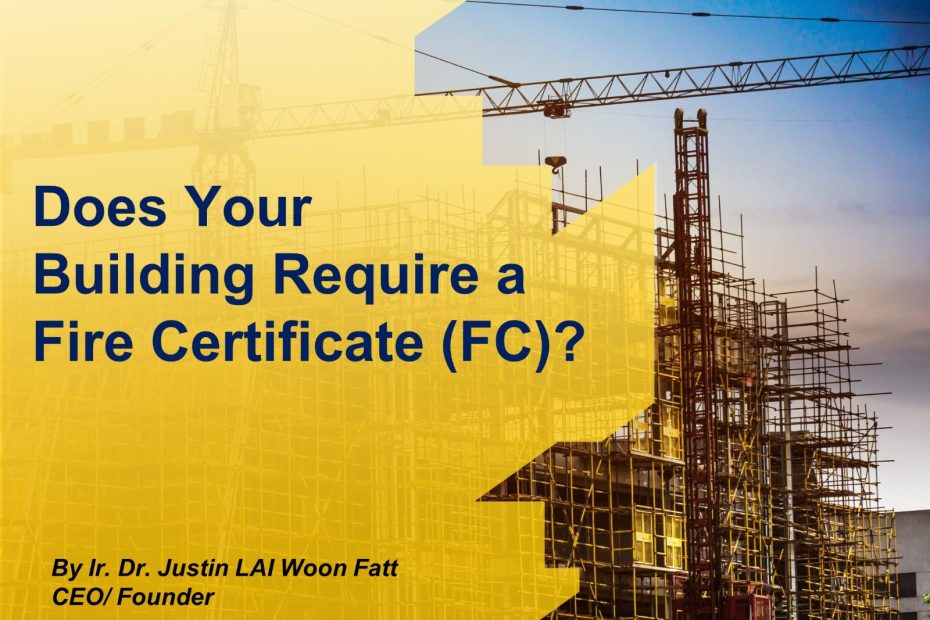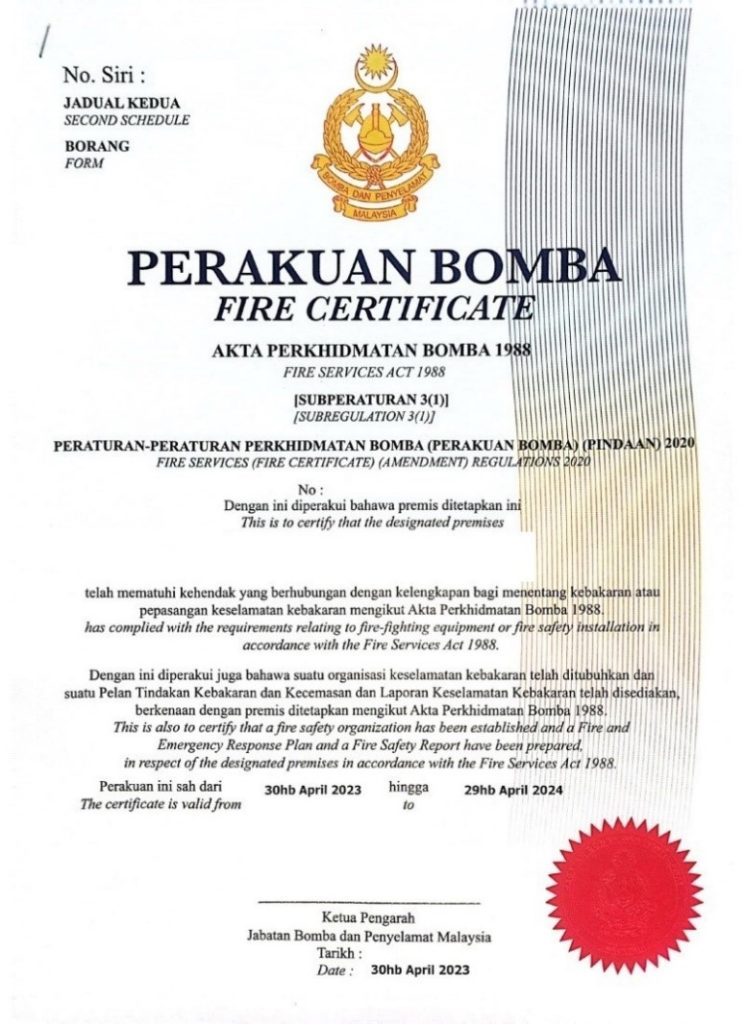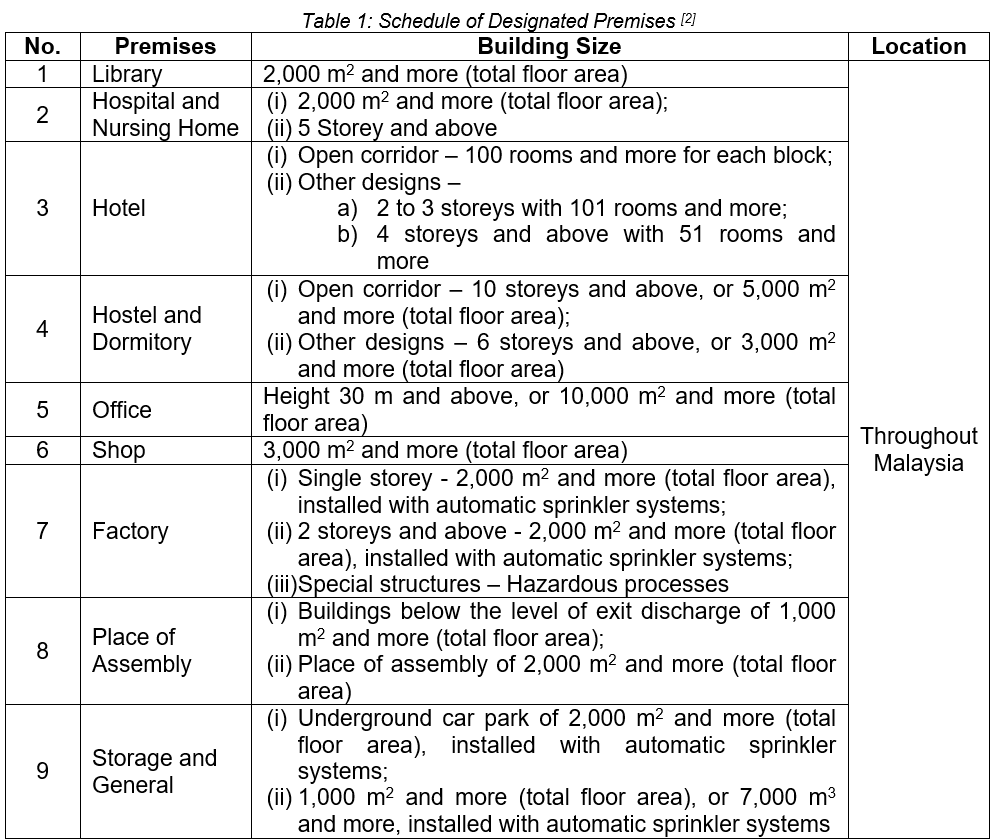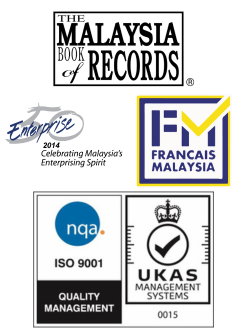Author: Ir. Dr. Justin LAI Woon Fatt | 27 May, 2024
Fire Certificate (FC) or ‘Perakuan Bomba’ in Bahasa Melayu, is a certificate issued by the Malaysian Fire and Rescue Department (BOMBA) to premises that are classified as designated premises as shown in Table 1. According to the Fire Services Act 1988, Section 28(1) and (2), all designated premises shall require a Fire Certificate and a Fire Certificate shall be renewed annually, except as stated in Section 28(3):
“Subsection (1) shall not apply to premises appropriated to, and used solely or mainly for, public religious worship, or premises consisting of or comprised in a house that is occupied as a single private dwelling: Provided that if in the opinion of the Director General there exists in the premises mentioned in this subsection any fire-hazard, the Director General may require such premises to be subject to periodic inspection and any necessary direction may be issued to the owner of such premises for due compliance of the provisions of this Act.” [1]
Failure to comply with this Act will result in guilty of the offence and shall be liable to a fine or/ and imprisonment as stated in Section 33 of the Act.
“Where there is no fire certificate in force in respect of any designated premises the owner of the premises shall be guilty of an offence and shall, on conviction, be liable to a fine not exceeding fifty thousand ringgit or to imprisonment for a term not exceeding five years or to both. ” [1]
Designated Premises that Require a Fire Certificate
Any designated premises with a Fire Certificate in Malaysia are not allowed to make any changes that may disrupt the fire protection and firefighting system of the building. A proposed plan for an application shall be submitted and approved by Bomba before the applicant can start any renovation work. The premises will need to apply for a new Fire Certificate as an amendment to the approved plans. Any person who fails to comply with the direction given by the Director General under paragraph shall be guilty of an offence [1].
In general, firefighting plan submission falls into two categories which are ‘Passive’ and ‘Active’. Passive Fire submission shall be endorsed by an Architect or C&S Professional Engineer with Practicing Certificate (PEPC) as the Principal Submitting Person (PSP), whereas Active Fire submission shall be endorsed by a Mechanical Engineer with PEPC. Before issuing a Fire Certificate, an inspection will be conducted to ensure the validity of the plan and application. The certificate should also be renewed annually, with applications that must be made no less than 30 days before the expiration date [3].
The Fire Certificate issued by BOMBA is a legal requirement for buildings to operate, and failure to obtain or maintain it can have various consequences. Some potential consequences include but not limited to:
- Buildings without a valid Fire Certificate may face legal actions and penalties. The authorities may take enforcement actions against the building owner or management, which could include fines or other legal consequences.
- Authorities may impose restrictions on the occupancy of the building. This could mean limiting or prohibiting the use of the building until the necessary fire safety measures are in place and a valid Fire Certificate is obtained.
- Insurance coverage for the building may be affected. Many insurance policies require compliance with safety regulations, and a lack of a Fire Certificate may result in reduced or nullified insurance coverage in the event of a fire or other emergencies.
- Buildings without proper fire safety measures pose a risk to public safety and lead to an increased risk of fire-related incidents, potentially endangering the lives of occupants and nearby residents.
- Non-compliance with fire safety regulations can result in reputational damage for the building owner or management by the perception among tenants, clients, and the general public.
- The absence of Fire Certificate or renewal of Fire Certificate may affect company’s business license renewal.
Conclusion
In a nutshell, a Fire Certificate for buildings under the Schedule of Designated Premises mentioned in Fire Services (Designated Premises) (Amendment) Order 2020 indicates that fire protection system have been implemented and that the building design is equipped, and safe. It is in accordance with the specifications and guidelines set by Uniform Building By-laws (UBBL), Fire Services Act, and Malaysian Standard (MS), as well as approved by BOMBA to obtain the issuance of Fire Certificate. Hence, it is important for all building owners to make sure that the designated premises have issuance of Fire Certificate.
Ir. Dr. Justin LAI Woon Fatt
CEO/ Founder
IPM Group
References:
[1] Laws of Malaysia. Act 341. Fire Services Act 1988, As at 1 October 2018. Retrieved on 27th May 2024 from https://www.bomba.gov.my/wp-content/uploads/2021/07/Act_341_Fire_services_act_1988.pdf
[2] Federal Government Gazette. Fire Services (Designated Premises) (Amendment) Order 2020. Attorney General’s Chambers. Retrieved on 27th May 2024 from https://www.bomba.gov.my/wp-content/uploads/2021/07/PUA289.pdf
[3] Fire and Rescue Department of Malaysia. Fire Certificate. Retrieved on 27th May 2024 from https://www.bomba.gov.my/perakuan-bomba/



